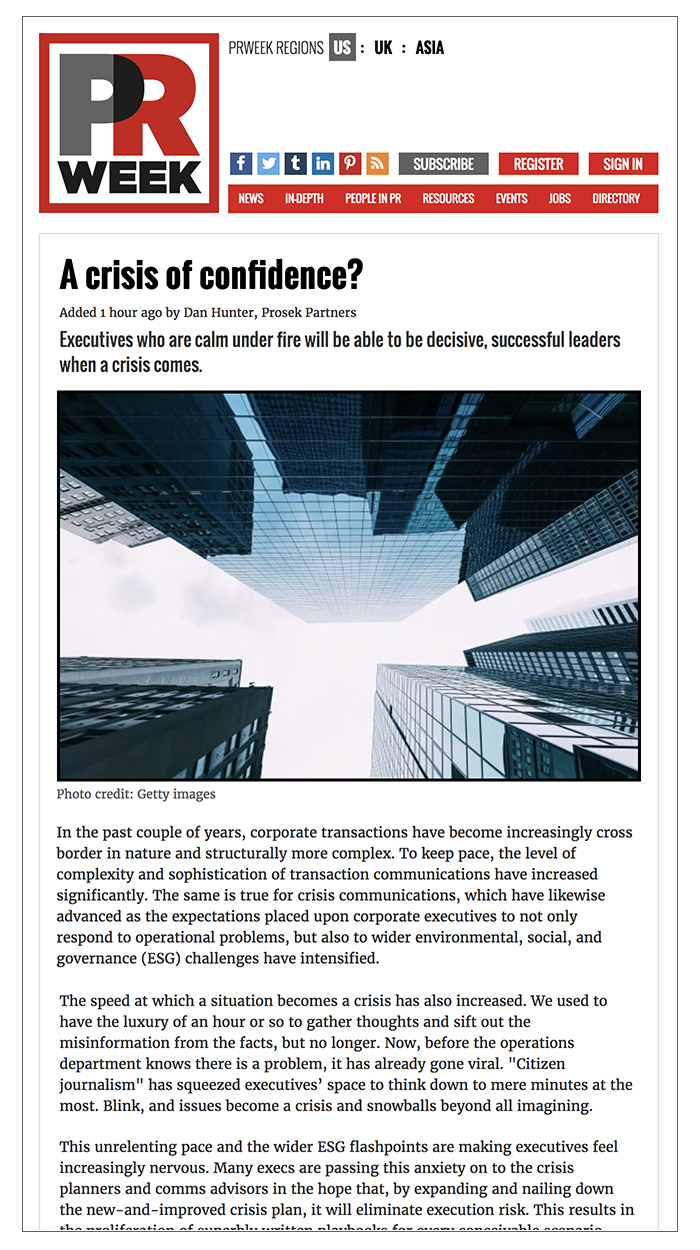 Executives who are calm under fire will be able to be decisive, successful leaders when a crisis comes.
Executives who are calm under fire will be able to be decisive, successful leaders when a crisis comes.
In the past couple of years, corporate transactions have become increasingly cross border in nature and structurally more complex. To keep pace, the level of complexity and sophistication of transaction communications have increased significantly. The same is true for crisis communications, which have likewise advanced as the expectations placed upon corporate executives to not only respond to operational problems, but also to wider environmental, social, and governance (ESG) challenges have intensified.
The speed at which a situation becomes a crisis has also increased. We used to have the luxury of an hour or so to gather thoughts and sift out the misinformation from the facts, but no longer. Now, before the operations department knows there is a problem, it has already gone viral. "Citizen journalism" has squeezed executives’ space to think down to mere minutes at the most. Blink, and issues become a crisis and snowballs beyond all imagining.
This unrelenting pace and the wider ESG flashpoints are making executives feel increasingly nervous. Many execs are passing this anxiety on to the crisis planners and comms advisors in the hope that, by expanding and nailing down the new-and-improved crisis plan, it will eliminate execution risk. This results in the proliferation of superbly written playbooks for every conceivable scenario.
There is clear evidence that this is the right place to start. Executives watching United Airlines rightly concluded that it was a failure in crisis planning. Given the airline’s policy on removing seated, paying passengers to make room for their own staff on full planes, they should have foreseen last year’s shambolic mess. Had the firm scenario-planned the enforcement of the policy, they would have immediately scrapped the ill-conceived practice and avoided the immense brand damage.
The same goes for them stuffing a French bulldog in the overhead bin. Given the number of passengers that claim their dogs must fly in the cabin for their emotional support, the death of a pet through negligence was again predictable. Indeed, United had 18 animals die while in transit in 2017, 900% more than any other US airline, so it was a perfectly obvious weakness to mitigate and crisis to plan for coming into 2018.
As for the gun investment crisis, again this was eminently predictable. I spent many years as the comms executive responsible for reviewing transactions and relationships with people or funding issues that could impact the brand. All exposures were carefully weighed, and if chosen, were prepared for. But what is striking about the gun exposure crisis in the U.S., is how quickly it took hold in the media. Andrew Ross Sorkin’s perfectly timed piece created a shockwave for the media to ride for weeks until it had impacted even the far-flung corners of the financial community, testing both the prepared and unprepared alike.
Observant CEOs correctly conclude that proper crisis plans pay for themselves a million times over in time and money, which is leading to the proliferation and refinement of crisis playbooks. However, as society, politics and technology shift almost every week in ways that are unforeseen, and crises are increasingly arising from incidents that management have not thought about or planned for and aren’t in the playbook.
Founder-CEOs are well-known for getting a free pass for their behavior, however I doubt that the CEO breaking SEC regulations on Twitter, accusing a diver who saved starving boys from a flooded cave of being a pedophile, or smoking weed and sipping whisky on a podcast, getting strangely introspective and self-revealing, was in Tesla’s playbook. The only predictable thing about these was the impact upon investor confidence and the wrath of the regulator.
Likewise, for Facebook. While it must be perfectly apparent to the firm that the honeymoon period of tech has been drawing to a close and that governments have a duty to regulate to protect people of all ages, even it is unlikely to have foreseen how it has been hijacked for malign purposes.
Yes, detailed playbooks are the necessary starting point, and like many executive committees, I find comfort in their thoroughness and the order that they provide. But in the face of the rising uncertainty and the unexpected ferocity and speed a crisis can move at, executives must not give in to the temptation to rely upon the playbook, as if it will get the organization through the fray on the day the crisis comes calling.
Playbooks don’t make decisions or communicate. People do. The act of planning is utterly indispensable, while the plans produced are not.
What is needed in many organizations today is a move beyond faith in the document, to confidence in themselves. This confidence can only be built when executives don’t shy away from but embrace the anxiety of live-fire drills. Only by enduring and surviving them can they build crisis muscle memory. It is this developed instinct that will get them through the opening volleys of a reputational battle.
There is no substitute for this. Only repeated, experienced discomfort can produce in them the calm presence of mind and confidence needed to lead their people effectively under fire. Yes, it is a brave CEO that chooses to undergo this experience behind closed doors with the possibility that personal weaknesses may be exposed for colleagues to see. But as my dad taught when I was little, it isn’t a lack of fear that makes someone brave, it is doing the right thing regardless.
In the end, it is only the executives that are calm under fire that will be able to be the decisive, successful leader and win through when that day comes. Only those who have internalized the benefits that realistic preparation brings can look to the future with reason for their confidence.
Dan Hunter is managing director in New York at Prosek Partners.
